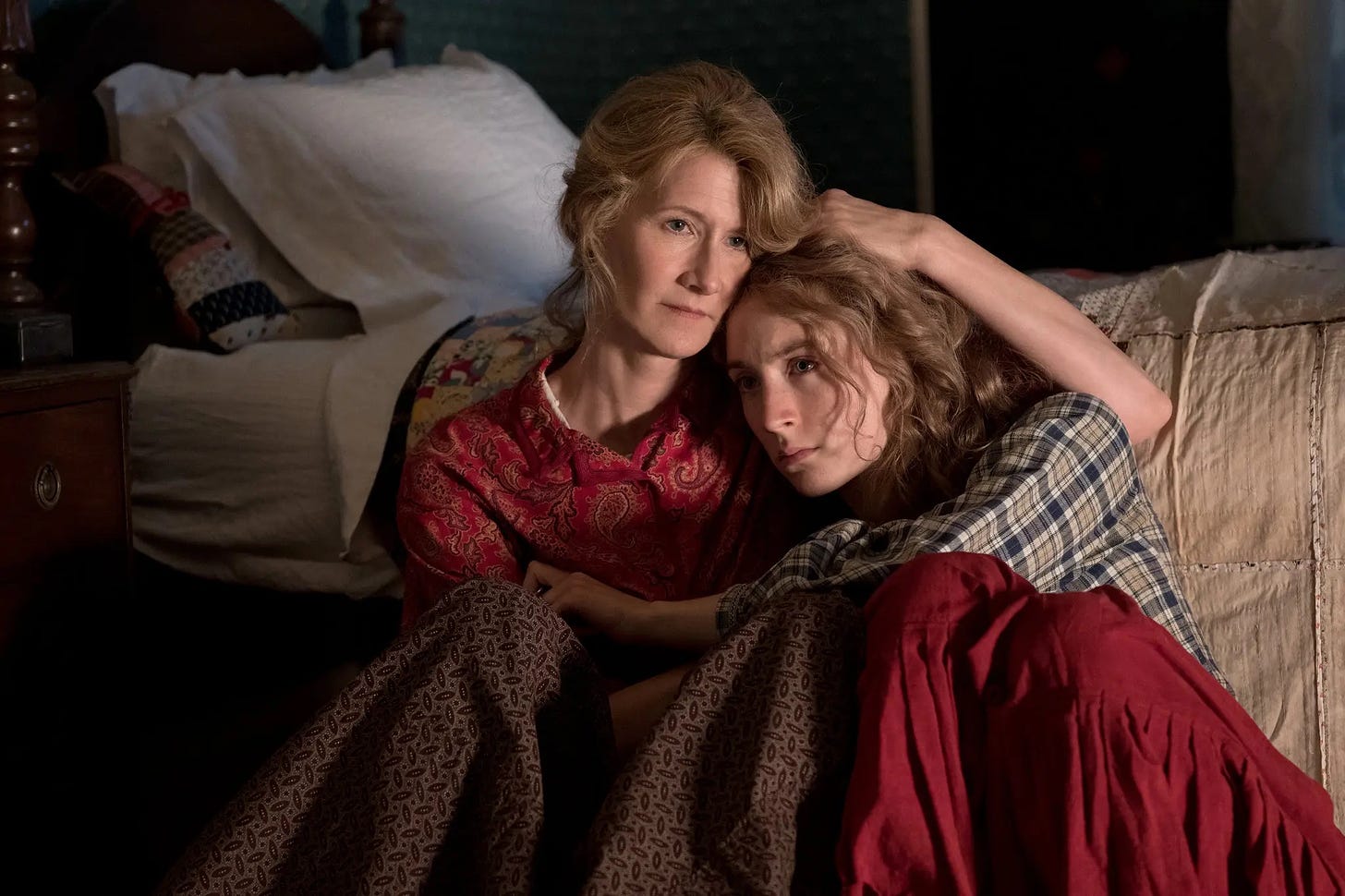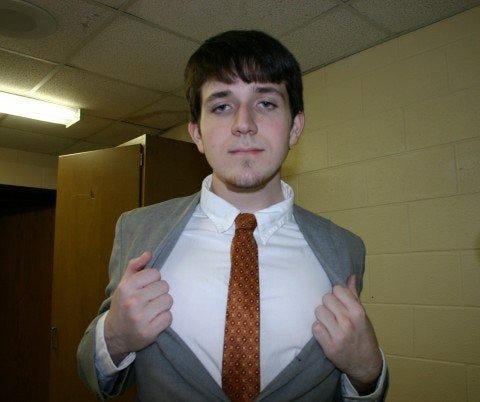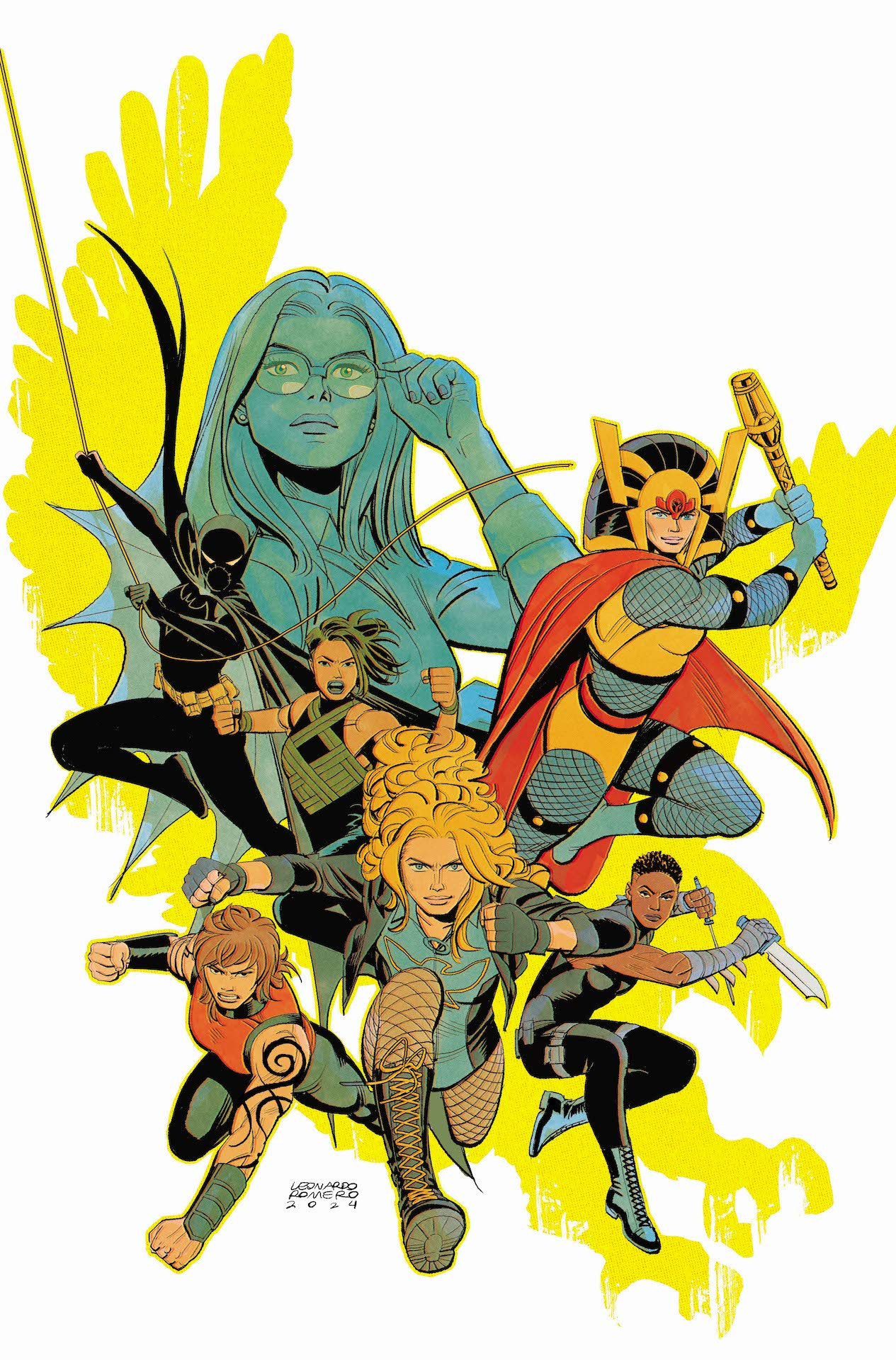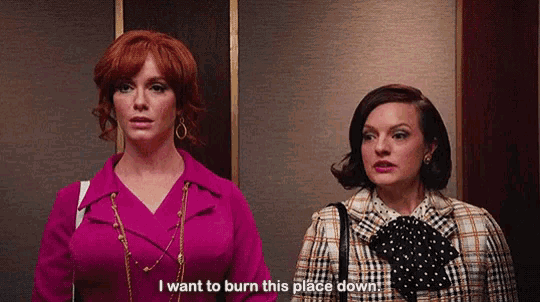The rage of 1,000 Lauras Dern
Finding permission to feel angry, quietly, in Greta Gerwig's 'Little Women'

Give or take an Emma Watson, Greta Gerwig’s 2019 adaptation of “Little Women” is a near-flawless film. Gerwig remixes Louisa May Alcott’s story into 135 endlessly revelatory minutes that transcend their period-piece trappings, and Timmy Chalamet also does a little dancey dance. The cinematography, alternately gold and cold, slaps. Beth’s death makes me cry every time. I genuinely believe you could find the whole of human experience reflected back at you in any given moment of the film.
In one scene I’ve used to torture my therapist before, superhumanly patient Marmee (Laura Dern) has a heart-to-heart convo with her headstrong (read: lesbian) daughter, Jo (Saoirse Ronan). The girl just almost let her insufferable little sister, Amy (Florence Pugh), drown in an icy pond out of spite.
In the aftermath, there’s this exchange:
Marmee: “You remind me of myself.”
Jo: “But you’re never angry.”
Marmee: “I’m angry nearly every day of my life.”
Jo: “You are?”
Marmee: “I’m not patient by nature. But with nearly 40 years of effort, I’m learning not to let it get the better of me.”
Contrary to popular belief, I am neither the sainted mother to four young girls coming of age in Civil War-era Massachusetts, nor am I the Academy Award-winning star of films like “Blue Velvet” and “Jurassic Park.” I am creation’s most beautiful idiot: a human boy. And yet, the line “I’m angry nearly every day of my life” cuts me to the bone.
But before pulling out my guts: caveats.
One, I’ve never read “Little Women” the novel, though we had a copy in the house growing up. (And I’ve also seen the Winona Ryder and Katharine Hepburn movies, FWIW.)
Two, Marmee is a woman raising smaller women in 1860s America, the particulars of which are not as dissimilar to modern life as one would prefer. My tenor in this issue will be very “yes, and,” but crucially, I am a man raising myself in 2020s America. For a deeper dive from a woman’s perspective, Sarah Blackwood wrote an analysis of this scene and “the Marmee problem” for The New Yorker, and there’s this Gerwig profile by Amanda Hess for The New York Times.
That’s actually a great jumping-off point. The world expects men to express the anger that it denies women. Boys fight, but as Robert Smith knows, they don’t cry. This particular gender role never interested me. If I can’t smooth things over with jokes or more earnest words, I will remove myself from a situation.
Being pleasant and responsible are lifelong priorities. As a teen of upper-percentile size and, let’s say, managerial temperament, I played a lot of authority figures in high school plays. The mayor in “The Music Man.” The judge in “Harvey.” Things of that nature.
Our director threw me a couple bones as an upperclassman. In a play called “The Death and Life of Larry Benson,” he cast me as an alcoholic father whose soldier son went M.I.A. This role required me to stipple on stubble with my makeup kit and perfect a barfly stagger. In the play’s big dramatic climax, the character got to slap someone, but it was less a moment of fiery rage and more a sad, crumpling tantrum.
Then, in the spring semester of my senior year, our school staged “… And the Rain Came to Mayfield,” another play about troubled fathers, misunderstood sons, and the angelic mothers caught between them. (Our teacher was working through some stuff, I guess.) “Mayfield” was the big U.I.L. competition play — the high point of the theatrical calendar.

Auditions for “Mayfield” came around, and I, in my Rachel Berry bag as drama club president, was eager for a big role to cap off four years onstage. I wanted to play the dad in “Mayfield” — violent, troubled, bigoted, scenery-chewing. Instead, the director cast me as one of two law enforcement agents with a single scene. A walk-on role, really.
The role of the father went to a friend of mine, who certainly deserved it as much as I did. He had the physical presence to pull off the heavy scenes, for one thing. Crucially, he had a temper and an edge I lacked; he had marked legal majority by tattooing the words “LOVE” and “HATE” on either side of his neck in jagged red letters.
Though I remember taking this all in stride, I’m sure my ego was bruised. Our director told me why I didn’t get the part. Not that I can remember if I even asked, and not that it would have mattered. He loved mess.
“You don’t have any rage inside,” he said. That stuck with me like rubber cement.
“Contrary to popular belief, I am neither the sainted mother to four young girls coming of age in Civil War-era Massachusetts, nor am I the Academy Award-winning star of films like ‘Blue Velvet’ and ‘Jurassic Park.’ I am creation’s most beautiful idiot: a human boy.”
Since retiring from the teenage theater circuit, I’ve found plenty of rage inside. Not in a powder keg way or anything. If you’re going to start a bar fight, find me in the car. It’s just that, as the proud-ish owner of a rigid internal compass, I’m given to indignation. The Hostess fruit pie of my anger is filled with a delicious compote of resentment built over the years.
I seethe about an adolescence lost to self-hatred and constant anxiety for no reason. I am apoplectic toward the church and the politicians that filled up my lost loved ones with ignorance. I hope Jerry Falwell is having a really bad time in hell.
Plenty of this anger has found its way to God, which is a handy way to never make a scene in public. Well, I did scream inside a Car2Go on the way home from seeing “Call Me By Your Name” for the first time, incandescent with rage that God never let me experience desire like that. (We don’t need to get into Elio-Oliver age discourse right now.)
A few years ago, depressed by a lack of dating success, I worked up the courage to ask a cute guy out. He said yes. “Finally,” I thought, “it’s happening!” I made dinner date reservations at a nice restaurant for the first time. The morning of the date, I messaged him to ask if we were still on. He told me he had to cancel, because his father had just died.
Truly, how awful. I felt so sad for him. And also, my most hideous, self-interested impulses furiously yelled to the ceiling of my bedroom: “Are you fucking kidding me?”
I can’t say I’ve lost that feeling entirely. It makes me think of another movie line, from 2012’s “The Avengers.” Mark Ruffalo’s Bruce Banner delivers the same sentiment as Dern’s Marmee. To turn into the Hulk, Banner famously needs to be angry. When a pivotal battle calls for some green muscle, he tells Chris Evans’ Captain America: “That's my secret, Cap. I'm always angry.”
The Hulk is a cartoon metaphor for traditional male rage, of course. He gets to let loose. He wouldn’t be much of a Hulk if he didn’t smash. I rarely smash. When I have, it’s been short and to the point. In middle school, a bully kept pushing me in the hall after band class. One day, I simply turned to the right and kicked him square in the dick. He hit the ground, and I silently kept walking. He stopped bothering me after that.
Marmee contains her anger to survive a hard, misogynistic world. Banner represses his rage to avoid ruining yet another pair of purple pants. Neither feels like a perfect fit. I refrain from expressing my discontent because … well, I was going to invoke WWJD bracelets, but even Jesus went Hulk in the temple that one time.
I just never saw outward rage as producing desirable conditions. Laura Dern never told me it was normal to feel that way. Being “good” was my No. 1 job as a kid. The few times that my dad yelled at my mom or my sister are what one might call Bad Memories. And honestly? I like to have a nice time. Being angry is not a nice time for me.
So, despite not relating to the context, I like that scene from “Little Women” because it makes room. If Laura Dern can be invisibly angry, then so can I.
One rad thing
Y’all need to get into DC Comics’ “Birds of Prey,” written by Kelly Thompson.
I read the title’s original run in the late 1990s and early 2000s and tirelessly vouch for the maligned 2020 movie adaptation. The new edition is currently at issue No. 15, and every one has been a goshdarn banger.
Thompson returns “Birds of Prey” to its core concept: best pals Black Canary (aka Dinah Lance) and Oracle (Barbara Gordon, née Batgirl) lead a rotating cast of superheroines on dangerous operations in the darkest corners of the DC universe. Think “Mission: Impossible” if it slayed. The art — usually by Leonardo Romero and Jordie Bellaire — is kinetic and the right kind of retro.
The raddest thing: the hilarious, heartwarming dynamic between team mainstays Big Barda (loudmouthed goddess built like a brick shithouse; raised on the hell planet Apokolips) and the current Batgirl (Batman’s ninja daughter Cassandra Cain; fights better than she talks). Scenes between this odd couple — both women raised to be weapons — are worth the cover price.
If you don’t read comics but want to start …
Outbound messages
Listen, I don’t want to write about the election. I’m pretty uninterested in sketching out some kind of personal essay about fascism. Have you read one that made you feel better, or that found useful depth in a deeply stupid time? Not I.
But in These Our Times, I think again and again about the essay “On Watching Mad Men in the Middle of a Pandemic,” written by Matt Zoller Seitz in 2020 for Vulture.
This essay’s main thrust is that “Mad Men” illustrates how people live through history, for better or worse:
“Mad Men got this, too: how mundane everyday existence continued back then, as well as in its designated flashback era, the 1930s, another period of massive unemployment and anxiety about the nation’s survival. The daily slog continued for Don and Peggy and Betty and Roger Sterling and Joan Harris and Harry Crane and every other character on the show, no matter what world-shaking event was happening beyond the front doors of their homes and workplaces.”
I found that sort of cross-decade continuity oddly comforting while munching homemade sourdough crackers in 2020. My favorite kind of writing makes a person feel less alone — and less unique, when that’s a helpful thing to feel.
Love y’all.






Welp, I burst into tears the minute I saw the photo for this post, because I knew you were going to reference “I’m angry nearly every day of my life,” so I hope you’re happy. Your column did a startlingly good job, as usual, of reflecting my own emotions and experiences despite it being a very personal essay. For the rest of the week, I think I might replace all my doom scrolling with essays about quiet rage, it feels very healing. Beautifully written, as usual.